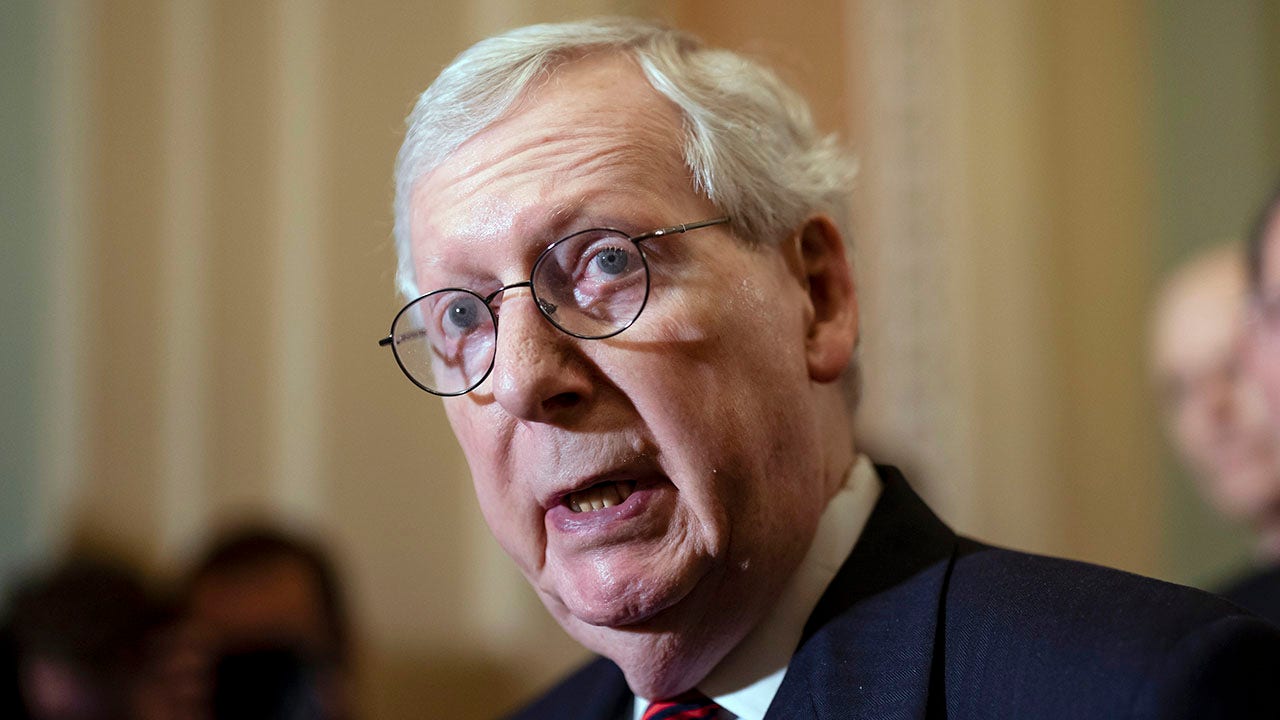I asked a learned lawmaker a few years ago about what they thought would happen to Senate Minority Leader Mitch McConnell, R-Ky. Former President Trump was in office and starting to take digs at the Kentucky Republican. McConnell was then the Majority Leader. Trump began lobbing verbal brickbats at McConnell, imploring him to shred the legislative filibuster in the Senate.
The lawmaker knew McConnell well. But doubted that Trump could lay a hand on McConnell.
“Mitch craves power,” said the lawmaker. “He’ll never leave. They’ll have to take him out of here in a pine box.”
Addison Mitchell McConnell isn’t leaving the Senate. Yet. The prophesy from the political soothsayer may yet come true. McConnell plans to remain in the Senate through at least January, 2027 — the end of his term.
CROWDED FIELD OF POTENTIAL MCCONNELL SUCCESSORS EMERGES IN SENATE
Senate Minority Leader Mitch McConnell, R-Ky., recently announced he would be stepping down as minority leader. (J. Scott Applewhite)
Anyone who aspires to a senior Congressional leadership position certainly craves power to some degree.
But political power is mutable. Protean. It fluctuates. And those who have power today are certainly not guaranteed to wield it tomorrow.
Especially on Capitol Hill.
It’s not known where McConnell stands on the congressional scale measuring the quest for power in Washington. McConnell procured power as the longest-serving Senate leader of either party, besting stalwarts like late Senate Majority Leaders Mike Mansfield, D-Mont., Joseph Robinson, D-Ark., Robert Byrd, D-W.V., and Alben Barkley, D-Ky.
But like the others, McConnell had only power — not superpowers.
And everyone lacks power over maintaining power.
MITCH MCCONNELL STEPPING DOWN AS REPUBLICAN LEADER
“I turned 82 last week. The end of my contributions are closer than I’d prefer,” said McConnell. “Father Time remains undefeated.”
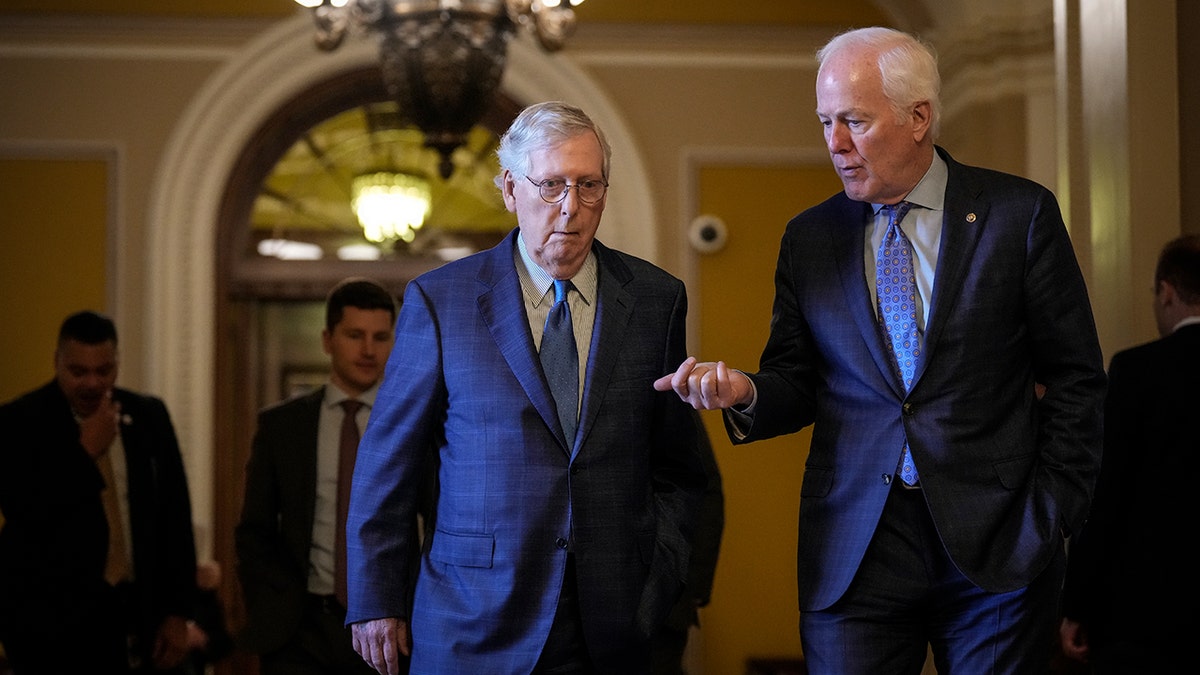
“I turned 82 last week. The end of my contributions are closer than I’d prefer,” said McConnell. (Drew Angerer)
It wasn’t so much that time caught up to McConnell. It’s just that so much time passed. That made it more challenging to preserve that power. Factors began multiplying. All working against McConnell.
Time and age began toiling against McConnell. There was his health. A bad fall last year kept McConnell out of the Senate for six weeks. McConnell then suffered several episodes where he froze in public – seemingly unable to speak.
Whispers began around the Senate corridors that McConnell’s time as Republican Leader was nearly up — even though McConnell secretly decided he would step aside from his post at the end of this Congress.
Former President Trump resumed his verbal assaults on McConnell, pushing for a new GOP Leader — especially if the former President returns to the White House.
But the rhetorical cartridge shells from the former president weren’t what drove McConnell out. They were a symptom. The Republican Party shifted over time. As the grains of sand slipped through the hourglass, so did the granules of McConnell’s power. Slowly. Methodically. But, surely.
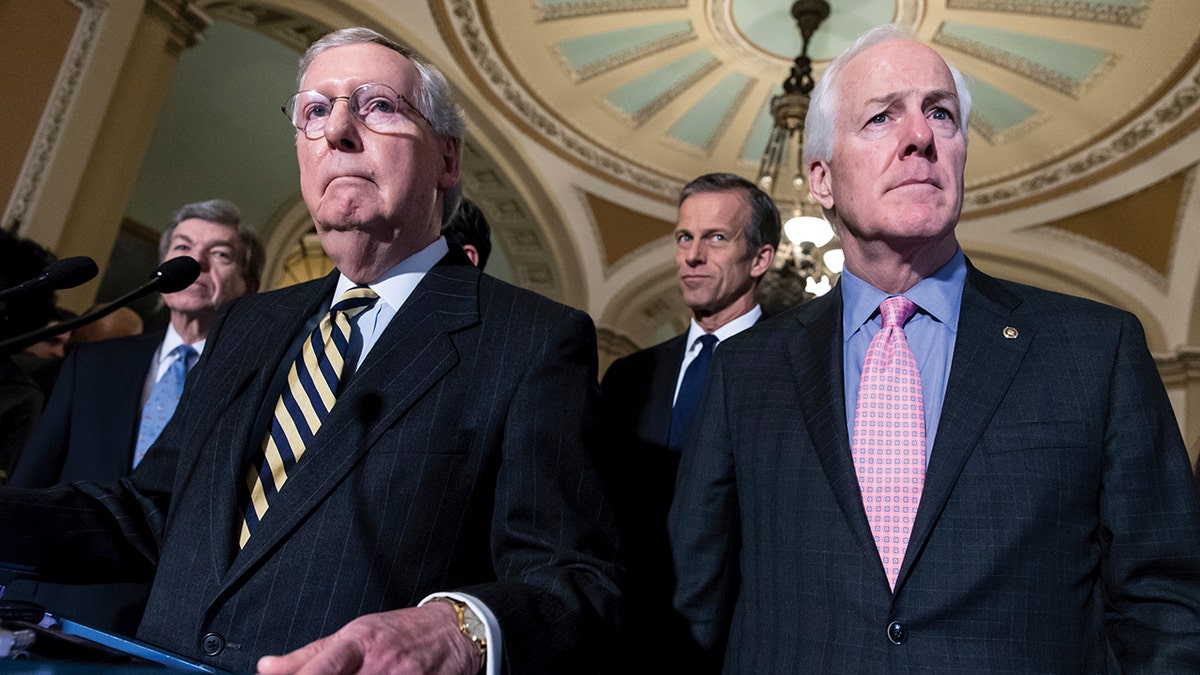
Sen. John Cornyn, R-Texas, right, announced his candidacy for minority leader. (J. Scott Applewhite)
McConnell said he arrived on Capitol Hill at the beginning of President Ronald Reagan’s second term. Unfamiliar with the new senator from the Bluegrass State, McConnell said the Gipper called him Mitch “O’Donnell.” Now McConnell departs with former President Trump calling him an “Old Crow.”
McConnell embraced the avian moniker. Like McConnell, Henry Clay is one of Kentucky’s other great statesmen, formerly a House speaker and senator. And as McConnell likes to tell it, Old Crow was Clay’s favorite bourbon. So McConnell said he was honored that Trump would liken him to Clay.
But a new “MAGA” breed of senator arrived on Capitol Hill in recent years. Sens. Mike Lee, R-Utah, Rand Paul, R-Ky., Ron Johnson, R-Wisc., Rick Scott, R-Fla., JD Vance, R-Ohio and Eric Schmitt, R-Mo. They’re not aligned with McConnell. In fact, a senior Senate Republican leadership source told Fox that some GOP senators are tired of what’s called the “MAGA show” at the weekly party conference lunches each Tuesday.
SEN. JOHN CORNYN DECLARES CANDIDACY FOR MINORITY LEADER AFTER MCCONNELL STEPS DOWN
And therein lies the problem for McConnell as his power eroded.
Like all things on Capitol Hill, it’s about the math.
There was no better metric in recent years to measure McConnell’s dwindling power than the exercise over the international aid package, which then became the international aid package with a border security plan. And then reverted back to an international aid bill.
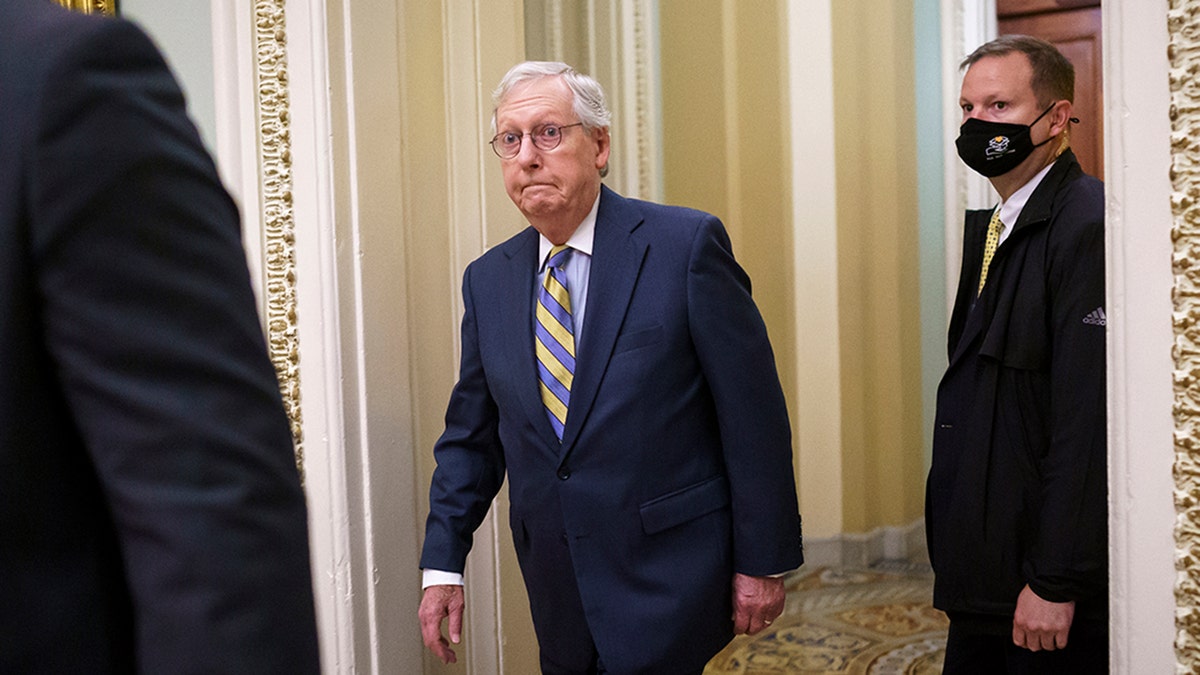
Senate Minority Leader Mitch McConnell, R-Ky., arrives at the Capitol in Washington, Wednesday, Oct. 6, 2021, as a showdown looms with Democrats over raising the debt limit. (J. Scott Applewhite)
McConnell wanted to advance the foreign money program — especially for Ukraine. But McConnell calculated that a robust border security package would sweeten the plan and satisfy members of his conference. That turned out to be a misjudgment. Support for a border plan diluted. And the bill went back to just international security.
McConnell hoped to get a majority of Republican senators to support the final product. That would be 25 out of 49 Republican senators. McConnell scored 22.
That’s not because McConnell stumbled. It’s because the Republican Party moved from where it would have been a few years ago. The political tectonic plates shifted. And the vote on the international aid bill served as a barometer reading of McConnell’s power.
McConnell grasped the political transference. His power may be dissipating. McConnel’s greatest power was his understanding of power. That never left him.
“Believe me, I know the politics within my party at this particular moment in time,” said McConnell on the Senate floor. “I have many faults, misunderstanding politics is not one of them.”
Who will succeed McConnell?
It is almost too early to divine where another power center will emerge to dictate who might succeed McConnell as the Senate’s top Republican. That political universe doesn’t even exist yet. Yes, for now, look at the three Johns: Senate Minority Whip John Thune, R-S.D., former Whip John Cornyn, R-Tex., and Senate Republican Conference Chairman John Barrasso, R-Wyo. Even someone like Sen. Tom Cotton, R-Ark., could be in play. A source tells Fox that Cotton is interested in a race.
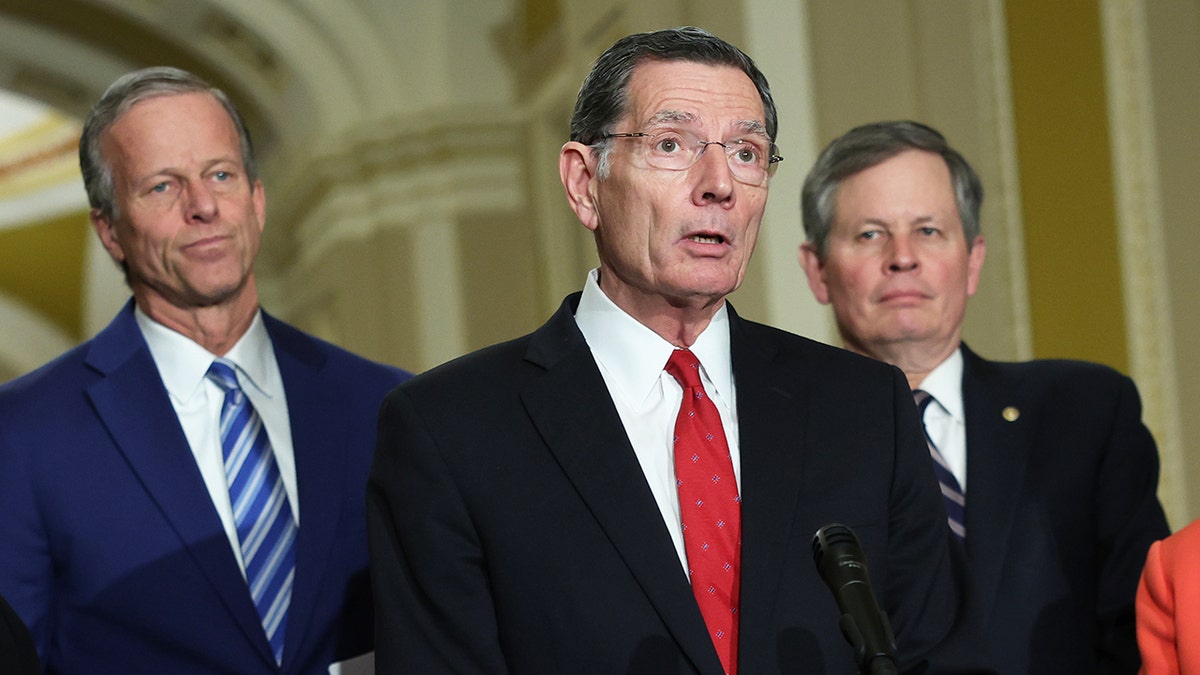
WASHINGTON, DC – MARCH 28: U.S. Sen. John Barrasso (R-WY) speaks after a Republican policy luncheon at the U.S. Capitol on March 28, 2023 in Washington, DC. (Kevin Dietsch)
But we don’t understand much else.
We must first know who wins the presidential election. And if 2024 is anything like 2020, that might take a while. A delay in figuring out the winner could postpone the internal secret leadership election which Senate Republicans will take in mid to late November. But the winner of the presidential election will define who the GOP wants – especially if former President Trump prevails and has something to say about it.
Another factor: which party has control of the Senate — and by how many seats. Keep in mind we didn’t know which party would control the Senate after the 2020 election until January of 2021.
This is why other figures may emerge. Especially dark horses.
As I have written before, leadership elections in Congress are not “partisan politics” They are “particle politics.” Factors which determine who is propelled into leadership are decided at the subatomic political level. Thus, it is hard to see who might prevail. Consider how former House Speaker John Boehner, R-Ohio, won in an upset to become House Majority Leader in 2006. Or how former House Speaker Paul Ryan, R-Wisc., got his job — despite saying he wasn’t interested. And who could have predicted what was in store for House Speaker Mike Johnson, R-La., say back in September?
A dark horse could emerge.
Imagine Republicans prevail with a substantial majority in November. In that case, Sen. Steve Daines, R-Mont., may be a possibility. Daines leads the National Republican Senatorial Committee (NRSC), the GOP’s campaign arm. Daines has made many of the right moves so far in pending political contests. If Republicans win the Senate by a good margin, some members (especially the new ones), might give Daines a look.
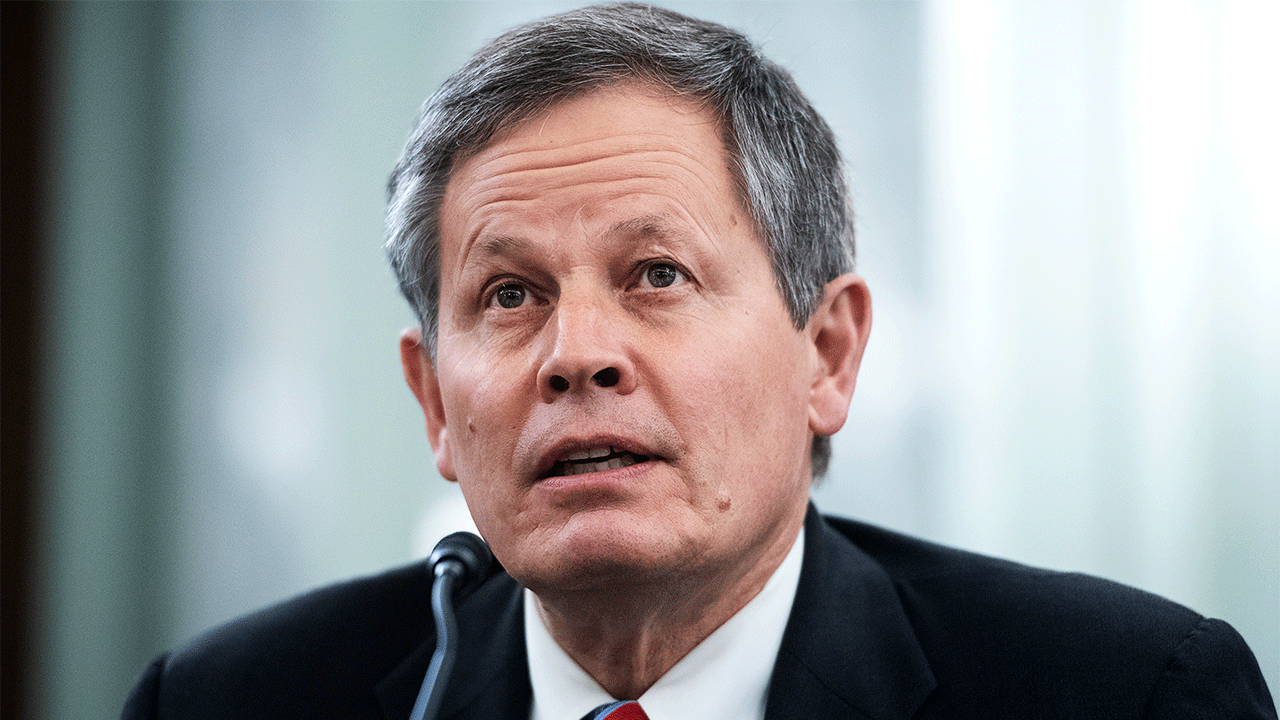
en. Steve Daines, R-Mont., testifies during the Senate Commerce, Science and Transportation Committee hearing titled Passenger and Freight Rail: The Current Status of the Rail Network and the Track Ahead, in Russell Building on Wednesday, October 21, 2020. (Tom Williams)
It will be someone’s time this fall. We just don’t know who.
It has been McConnell’s time for more than 17 years on Capitol Hill.
And now it’s not.
Father Time is undefeated.
CLICK HERE TO GET THE FOX NEWS APP
And power is elusive. Always deteriorating.
Political leaders are powerful. But powerless over their power.


